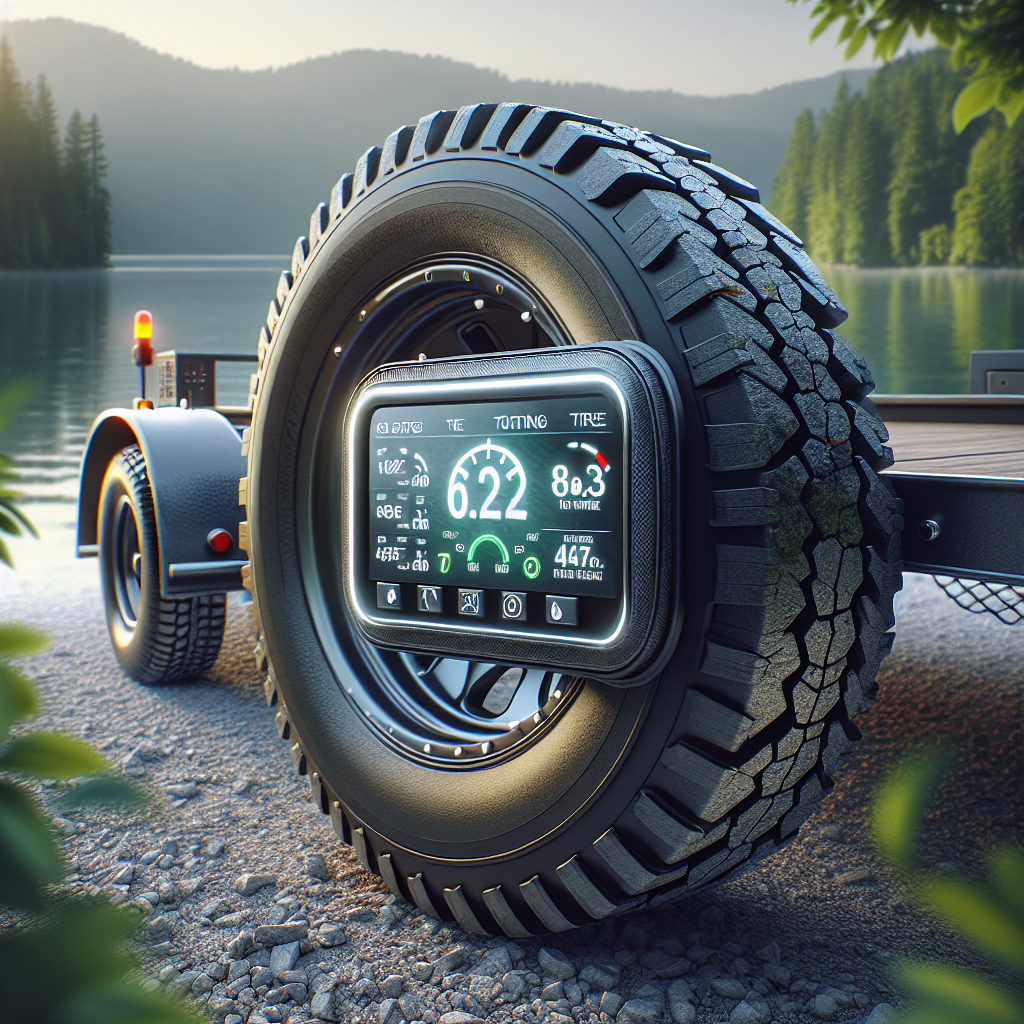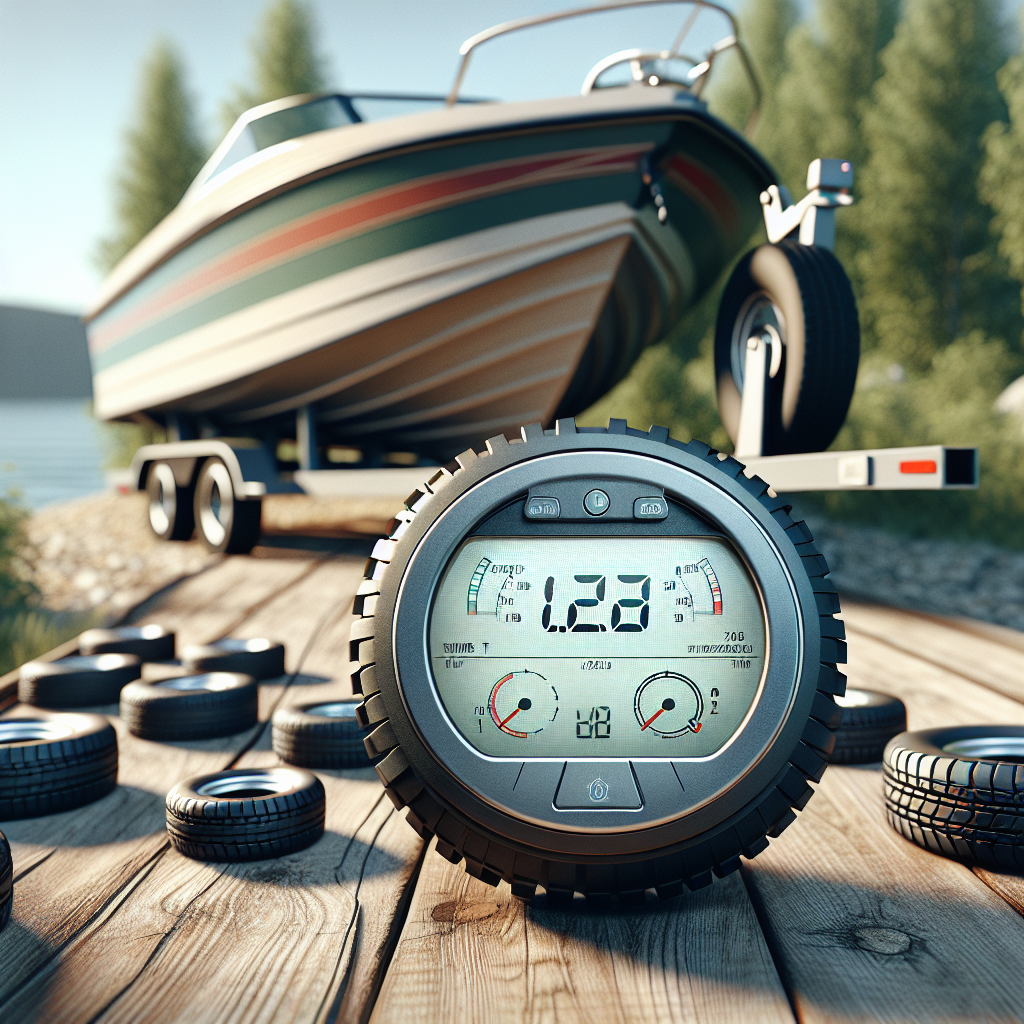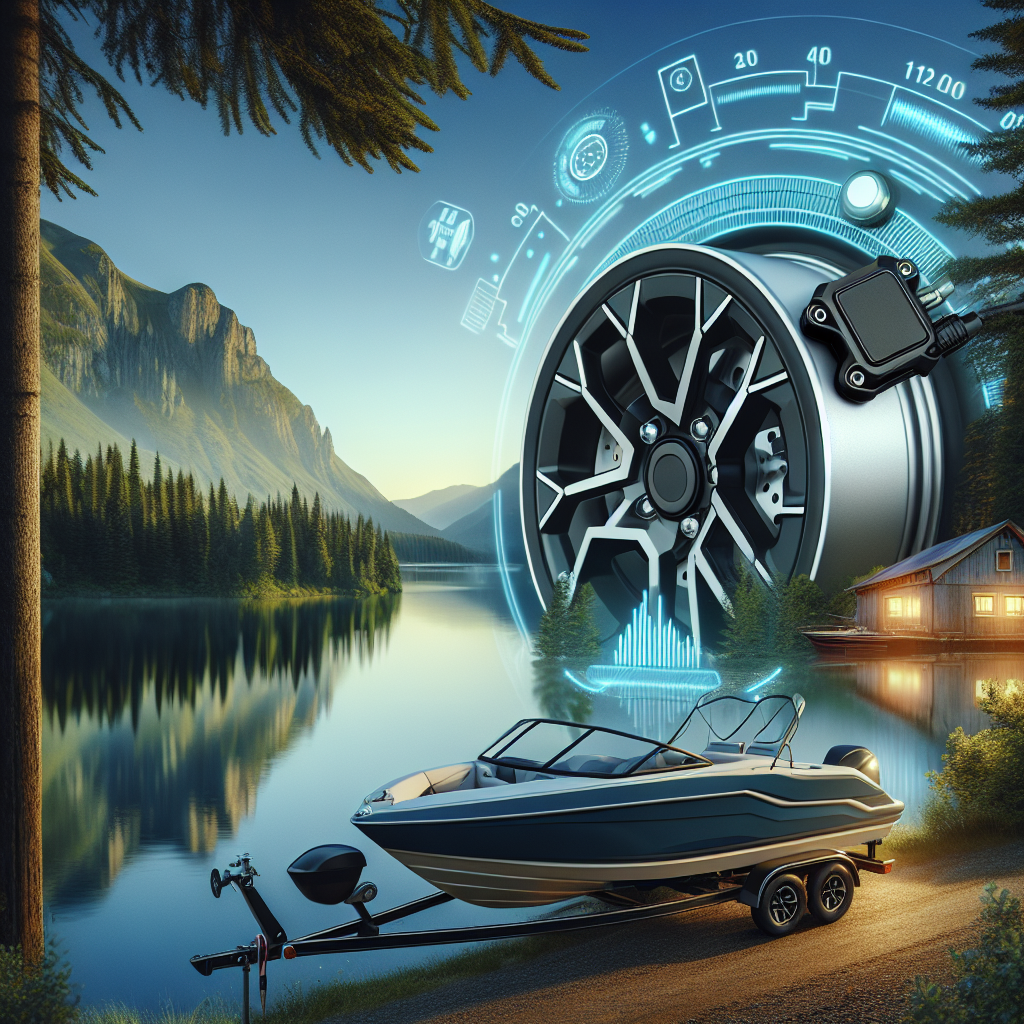Tire pressure monitoring systems (TPMS) are essential tools for anyone involved in towing, particularly for boat trailers. These systems are designed to provide real-time data regarding tire pressure, helping to ensure that your tires remain within the optimal PSI range. Maintaining proper tire pressure is crucial for enhanced safety and efficient performance while on the road.
For boat trailers, where weight distribution can be uneven and tires are subjected to varying pressures due to temperature changes, a reliable TPMS becomes even more critical. Here are some key benefits of utilizing a tire pressure monitoring system for your boat trailer:
- Improved Safety: By monitoring tire pressure, you can prevent blowouts and other tire-related incidents that can lead to accidents.
- Enhanced Fuel Efficiency: Properly inflated tires reduce rolling resistance, which can lead to better fuel economy.
- Extended Tire Lifespan: Maintaining the correct tire pressure helps in reducing wear and tear, ultimately prolonging the life of your tires.
- Real-Time Alerts: Many TPMS offer alerts for low tire pressure, ensuring you are aware before it becomes a serious issue.
When you invest in a tire pressure monitoring system for your boat trailer, you are not just buying a gadget; you are enhancing your towing experience. Tow with peace of mind, knowing that trailerwatchdog is standing guard, providing the essential data you need for a safe journey.
Importance of Tire Pressure for Boat Trailers

The importance of maintaining optimal tire pressure for boat trailers cannot be overstated. Proper tire pressure plays a vital role in ensuring safe towing, as well as enhancing the overall performance of your trailer. When tires are inflated to the correct pressure, several advantages arise that contribute to a smooth and secure towing experience.
Firstly, correct tire pressure helps in maintaining stability while towing. Under-inflated tires can cause excessive flexing, leading to instability and an increased risk of swaying, especially at highway speeds. This instability can be alarming and dangerous, particularly when navigating sharp turns or changing lanes.
On the other hand, over-inflated tires can lead to reduced traction, as they have less surface area in contact with the road. This can make it difficult to control the trailer, especially in adverse weather conditions. Maintaining the right tire pressure ensures that the tires perform optimally, providing better grip and control.
Additionally, tire pressure directly impacts fuel efficiency. When tires are properly inflated, they reduce rolling resistance, which can lead to lower fuel consumption. This is particularly important for boat trailers, as the added weight of the boat can put extra strain on the vehicle's engine.
Lastly, proper tire pressure extends the lifespan of your tires. Consistently operating with the correct PSI prevents uneven wear and tear, ensuring that your tires last longer and perform better over time. In summary, monitoring and maintaining tire pressure is crucial for safe, efficient, and long-lasting trailer operation.
How Tire Pressure Affects Boat Trailer Performance
The performance of your boat trailer is significantly influenced by tire pressure, affecting various aspects of towing and handling. Understanding this relationship is essential for every boat owner who wants to ensure a safe and efficient towing experience.
When the tire pressure is at the recommended level, handling improves dramatically. Properly inflated tires maintain their shape and provide better contact with the road surface. This consistent contact translates into enhanced steering responsiveness and stability, making it easier to navigate through diverse driving conditions.
Conversely, when tire pressure is too low, the trailer becomes more susceptible to blowouts and damage. Low pressure can lead to overheating as the tires flex more than they should, which can cause them to wear out prematurely or even fail while on the road. This not only endangers the boat and trailer but also poses serious risks to other road users.
Adequate tire pressure also plays a crucial role in braking performance. When tires are under-inflated, they can lengthen stopping distances, making it challenging to halt the trailer quickly in emergencies. On the other hand, maintaining the right tire pressure ensures that the trailer responds effectively to braking, allowing for safer stops.
Furthermore, tire pressure impacts fuel efficiency. Properly inflated tires reduce rolling resistance, which can lead to decreased fuel consumption during towing. This is particularly beneficial for longer trips, where the savings can accumulate significantly.
Ultimately, keeping an eye on tire pressure not only enhances performance but also contributes to a more enjoyable boating experience, enabling you to focus on the adventure ahead.
Key Features of Effective Tire Pressure Monitoring Systems

In today's world, a reliable tire pressure monitoring system (TPMS) for boat trailers is essential for ensuring safety and optimal performance. These systems come equipped with several key features that enhance their effectiveness and usability.
Firstly, **real-time monitoring** is a critical aspect of any effective TPMS. This feature continuously tracks the tire pressure and temperature, providing instant feedback to the user. With real-time data, trailer owners can quickly identify issues before they escalate into serious problems.
Another important feature is **alert notifications**. A quality TPMS will send alerts to your smartphone or display screen when tire pressure falls below or exceeds safe limits. These alerts ensure that you are immediately informed, allowing you to take corrective action without delay.
Easy installation is also a hallmark of effective tire pressure monitoring systems. Many TPMS products are designed for user-friendly installation, often requiring minimal tools and time. This accessibility allows boat owners to upgrade their trailers without the need for professional assistance.
Additionally, **battery life** and **durability** are critical considerations. The best TPMS options utilize long-lasting batteries and robust materials to withstand the rigors of towing. This durability ensures that the system functions reliably in various environmental conditions.
Lastly, an effective TPMS should feature **historical data tracking**. This capability allows users to review past tire performance, helping them identify patterns and make informed decisions about maintenance and tire management.
By incorporating these key features, a tire pressure monitoring system not only enhances the safety of your boat trailer but also contributes to a smoother and more enjoyable towing experience.
Best Practices for Maintaining Tire Pressure on Trailers

Maintaining optimal tire pressure is crucial for the safety and performance of trailers, especially when towing boats. Implementing best practices for tire pressure maintenance can significantly improve the lifespan of your tires and enhance overall towing efficiency.
First and foremost, it is essential to **check tire pressure regularly**. Ideally, tire pressure should be inspected at least once a month and before any long trips. Changes in temperature and load can affect pressure levels, making regular checks vital to ensure they remain within the manufacturer's recommended range.
Using a **quality tire pressure gauge** is another best practice. Digital gauges provide accurate readings and are easy to use. Always ensure that the gauge is calibrated and in good working condition to avoid discrepancies in measurements.
Additionally, **monitoring tire temperature** is equally important. Overheating can indicate low pressure or other underlying issues. A tire pressure monitoring system (TPMS) can help keep track of both pressure and temperature, alerting you to any abnormalities as they arise.
Another key aspect of maintenance is ensuring that tires are properly **aligned and balanced**. Misalignment can lead to uneven wear and inconsistent pressure. Regularly inspecting and adjusting alignment can enhance tire longevity and improve towing performance.
Moreover, consider the **load capacity** of your trailer. Overloading can cause excessive wear on tires and lead to pressure loss. Always adhere to the manufacturer's weight specifications and distribute loads evenly across the trailer's axles.
Lastly, don't forget to **rotate tires** periodically. This practice helps distribute wear evenly and prolongs the life of the tires. Consult your trailer’s manual for specific recommendations on rotation frequency.
By following these best practices, you can maintain optimal tire pressure on your trailer, ensuring a safer and more efficient towing experience.
Choosing the Right Tire Pressure Monitoring System for Your Trailer

Selecting the appropriate **tire pressure monitoring system (TPMS)** for your trailer is essential to ensure safety, efficiency, and performance while towing. With various options available, understanding the key features and benefits will help you make an informed decision.
First, consider the **type of system** you need. Some TPMS options provide real-time monitoring, which can alert you instantly if tire pressure drops below a safe level. This feature is particularly beneficial for long distance towing, where timely alerts can prevent potential blowouts.
Another important factor is **sensor quality**. Look for systems that come with high-quality, durable sensors that can withstand varying weather conditions and rough terrain. Wireless sensors are often preferred for their ease of installation and maintenance, but ensure they provide reliable communication with the display unit.
It’s also wise to assess the **monitoring range** of the TPMS. Ensure that the system can effectively monitor all tires on your trailer, including any additional axles or spare tires. Some systems offer expandable capabilities, allowing you to add more sensors as your needs grow.
Compatibility with your specific trailer type is crucial as well. Some TPMS are designed specifically for boat trailers, taking into account the unique challenges faced when towing marine vehicles. Make sure the system you choose is tailored to your trailer’s requirements.
Lastly, consider the **user interface** of the monitoring system. A clear, easy-to-read display can simplify monitoring and provide quick access to important data. Some systems even offer smartphone integration, allowing you to keep track of tire pressure and temperature directly from your mobile device.
By taking these factors into account, you can confidently select a tire pressure monitoring system that meets your needs. Tow with peace of mind, knowing that trailerwatchdog is standing guard.








